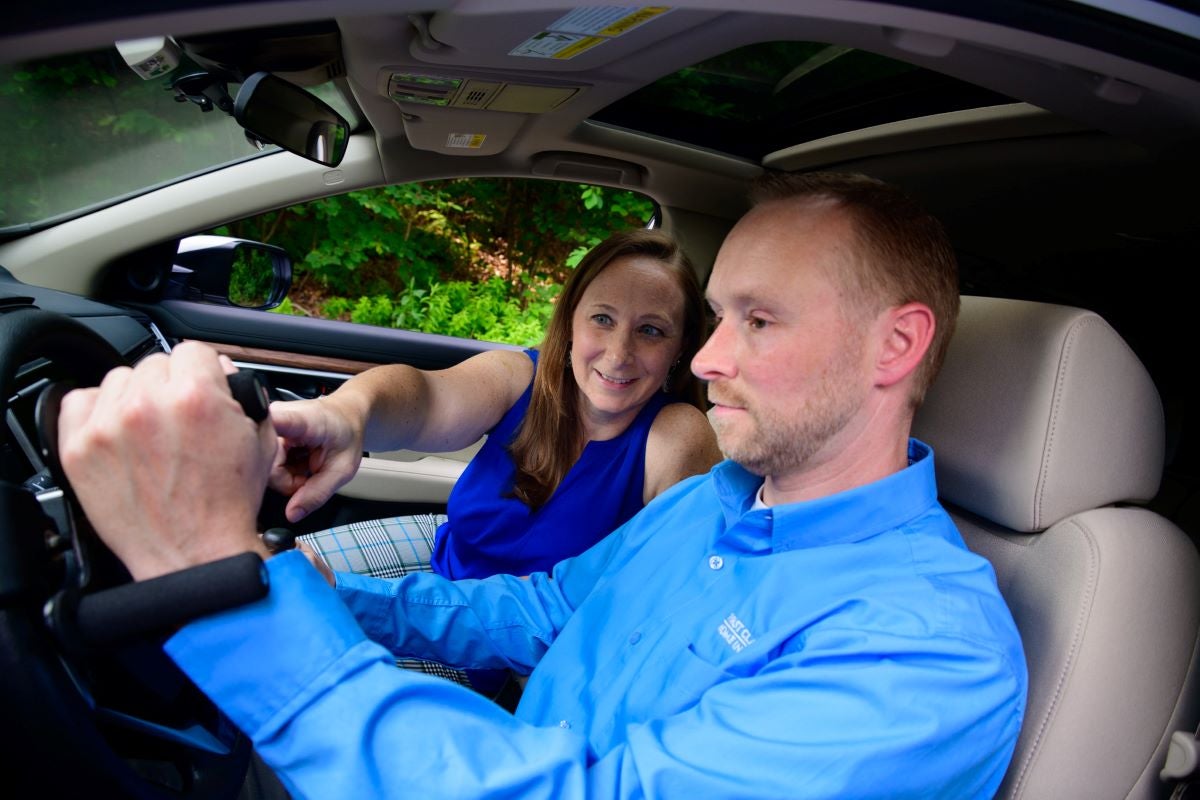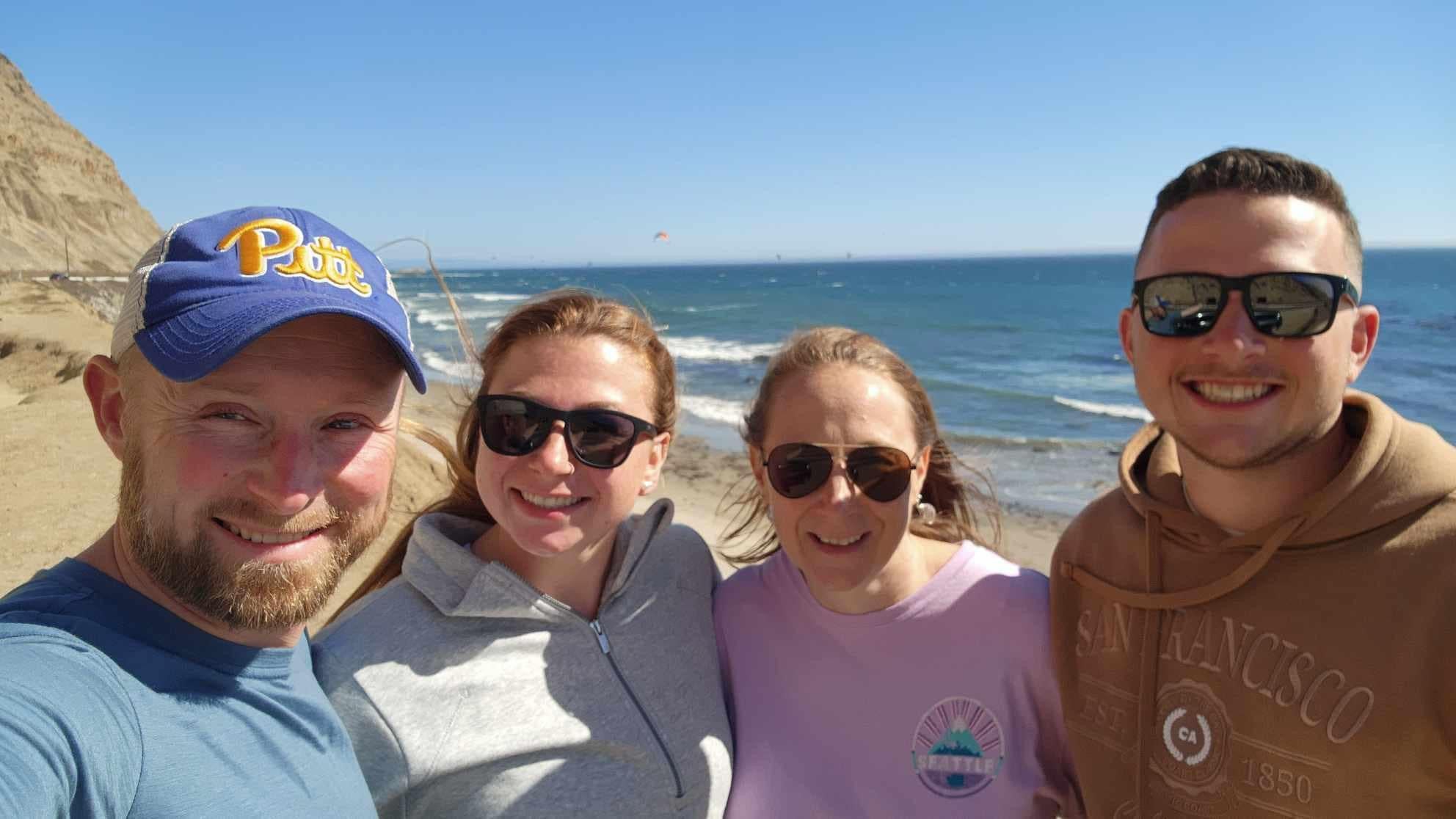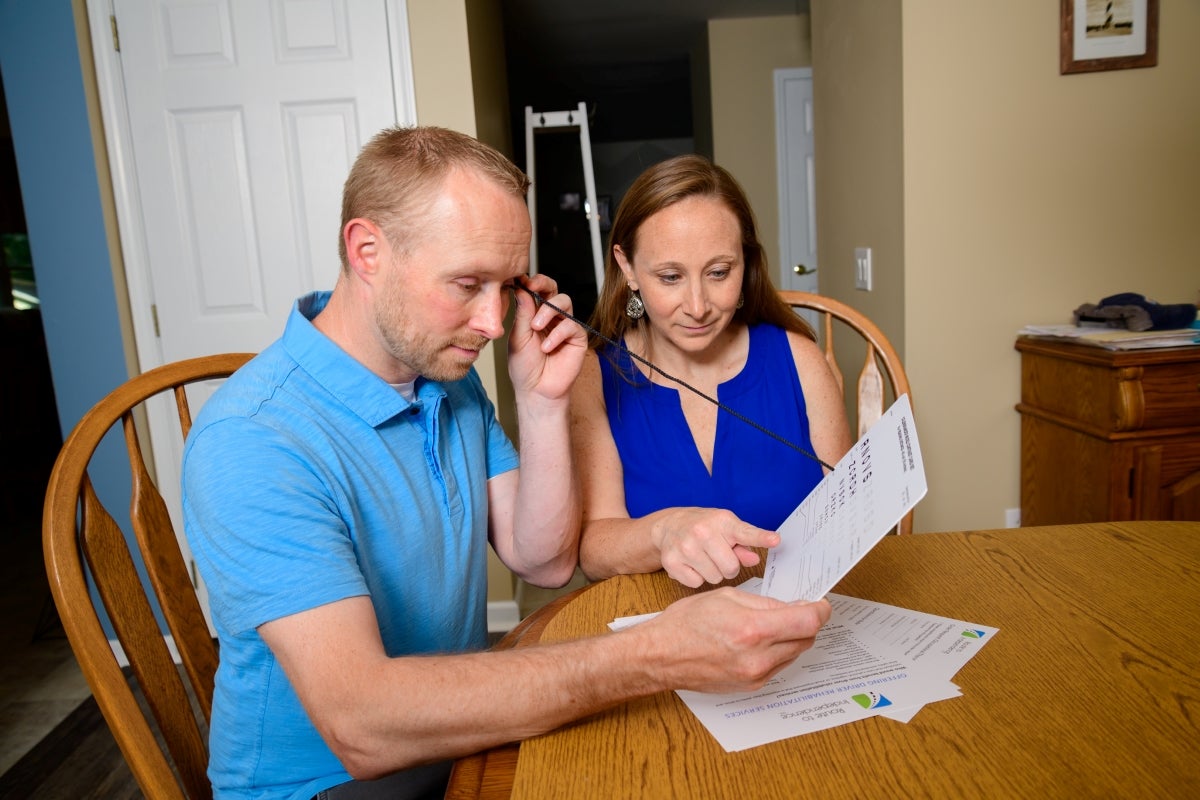
Adaptive Driving Program Director Melissa Aleksak with Mary, an 18-year-old client who learned to use hand controls to drive and not only graduated from the program with a winning smile, but also gained new confidence and independence.
Melissa Aleksak is the consummate interprofessional dedicated to improving lives. An established occupational therapist (OT) who owned her own business as a driver rehabilitation specialist in Scranton, PA, she moved to Pittsburgh in 2022 to become the director of the School of Health and Rehabilitation Sciences (SHRS) Adaptive Driving Program where she works alongside assistive technology experts in the Department of Rehabilitation Science and Technology.
For nearly 20 years, the Adaptive Driving Program has been providing driver rehabilitation services to individuals with a variety of driving needs in specially adapted vehicles as part of their rehabilitation and pathway to independent living. The driver rehabilitation specialists conduct personalized assessments with clients to determine driving readiness and develop necessary skills to navigate the road safely. The program provides many solutions for various circumstances—including specialized training, vehicle modifications and adaptive driving equipment to increase accessibility for all drivers.

Melissa Aleksak, assistant professor and director of the Adaptive Driving Program, instructing a client who is using adaptive driving equipment.
Searching for the Ideal Post-Professional Doctoral Degree
Even while being a proud mom to her grown son and daughter, volunteering with Blue Star Mothers of Southwestern Pennsylvania, and helping people every day at the Adaptive Driving Program regain their independence, Aleksak had her eye on pursuing a doctoral degree. Her master’s degree in occupational therapy from the University of Scranton led to a rewarding career working with patients in acute care, skilled nursing, inpatient rehabilitation, inpatient mental health, home health and pediatrics, and working with students as an academic fieldwork coordinator and then director of an Occupational Therapy Assistant program.
For her next step, however, she wanted a program that would provide more applied professional and leadership growth to enhance her clinical practice, something with a different focus than the Doctor of Occupational Therapy.
Luckily, she didn’t have to look far for the ideal program. When she learned about the University of Pittsburgh post-professional Doctor of Clinical Science (CScD) in Occupational Therapy program, she discovered that it is designed for experienced practitioners who want to take the next step and become clinical leaders in the field of occupational therapy. Aleksak was excited to see that the program would help her develop the expertise to utilize evidence-based research and engage with community partners to implement change.
Program Director Pamela Toto explains, “Our program teaches students not just how to read a journal or research article, but how to interpret it with a clinical eye and then how to take the information, develop a plan and make it part of their practice. Our students apply and execute these new skills through the lens of their clinical or academic area of interest. These are not necessarily occupational therapist-specific skills, but they are critical skills needed across disciplines and especially in health care. Pitt is unique in offering such training in knowledge translation and implementation.”
A Curriculum for Working Professionals to Implement Change
The post-professional CScD in Occupational Therapy program is 100% on-line and designed for working OTs. “I realized this program was a good fit for me,” Aleksak says and began classes in August 2023. “I love the flexibility of the program and the structure of classes.”

Melissa Aleksak (second from right) enjoying time off from work and school in California with her son Paul (far right), a U.S. Coast Guard member stationed in Seattle, her daughter Gabriella (second from left) who is graduating nursing school in December and will begin working at UPMC Mercy, and her significant other, Robbie Risley, who is a home inspector and operates his own business (far left).
The curriculum is strategically designed to give students the advantage of actively engaging in the courses by implementing what they learn into their current job.
“This is one aspect that I really like about this program,” says Aleksak. “Each semester I have been able to complete course assignments related to my area of practice. In turn, the assignments have had significant value to me and have helped me in my role as a driver rehabilitation specialist and as the director of the Adaptive Driving Program.”
“I love learning and have really enjoyed the curriculum. Some of my favorite learning assignments so far include writing a scoping review, writing a paper that focused on qualitative data, developing a theory of change, and learning how to utilize tools such as the Knowledge to Action Framework and Consolidated Framework for Implementation Research to guide me in translating knowledge into practice and implementing change.”

Melissa Aleksak assists an Adaptive Driving Program client with vision testing.
CScD students are also encouraged to design their final capstone project into something that would make a difference in their job.
“One area that I am continuing to focus on in my courses and for my capstone is implementing change in the way we provide services to new drivers that are neurodivergent. Our current assessments and training strategies are not the most effective or evidence based and I feel we can do better!”
Other CScD in OT graduates have gone on to use the coursework and their capstone projects to engrave their names as positive agents of change in their professional environments. The SHRS Adaptive Driving Program has even more success in its future thanks to the dedication of Melissa Aleksak and the supportive faculty of Pitt OT.
----------------------------------
Interested in learning more about the Doctor of Clinical Science in Occupational Therapy program? Reach out to our enrollment specialist at enroll@shrs.pitt.edu today!
